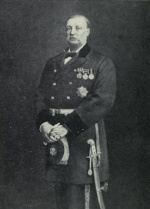Difference between revisions of "Robert Sandeman"
(New page: '''Robert Groves Sandeman''' (25 February 1835 - 29 January 1892) was an army officer in the East India Company and political officer in modern day Pakistan. An advocate of diplomacy and w...) |
|||
| (One intermediate revision by the same user not shown) | |||
| Line 1: | Line 1: | ||
| + | [[Image:Robert Sandeman.jpg|thumb|150px|right|Sir Robert Sandeman]] | ||
'''Robert Groves Sandeman''' (25 February 1835 - 29 January 1892) was an army officer in the East India Company and political officer in modern day Pakistan. An advocate of diplomacy and what is today called 'soft power' he is thought to have coined the popular phrase 'hearts and minds' in the context of counterinsurgency. | '''Robert Groves Sandeman''' (25 February 1835 - 29 January 1892) was an army officer in the East India Company and political officer in modern day Pakistan. An advocate of diplomacy and what is today called 'soft power' he is thought to have coined the popular phrase 'hearts and minds' in the context of counterinsurgency. | ||
| Line 11: | Line 12: | ||
==Notes== | ==Notes== | ||
<references/> | <references/> | ||
| + | [[category:Counterinsurgency|Sandeman, Robert]] | ||
Latest revision as of 16:51, 15 June 2009
Robert Groves Sandeman (25 February 1835 - 29 January 1892) was an army officer in the East India Company and political officer in modern day Pakistan. An advocate of diplomacy and what is today called 'soft power' he is thought to have coined the popular phrase 'hearts and minds' in the context of counterinsurgency.
Imperial Service
Sandeman was appointed an assistant commissioner in the Punjab in 1859. In 1866 he was selected as deputy commissioner responsible for local judicial and administrative arrangements as well as managing tribal relations. He pioneered the highly successful ‘tribal service’ system dealing directly with hereditary leaders, who were made responsible for maintaining order among their own people. [1]
In 1876 he expanded British influence in Balochistan by securing a settlement between the Khan of Kalat and his rebellious Sirdars. He also negotiated a treaty that secured the Bolan Pass to Afghanistan and allowed for the stationing of troops in the khanate of Quetta. On 21 February 1877 he was appointed the governor-general's agent in Baluchistan, which made him responsible for the administration of the area. When the Second Anglo-Afghan War broke out in November 1878, British troops were able to pass through Baluchistan and the Bolan Pass without hindrence and apparently with local support. [2]
"Hearts and Minds"
According to the academic Rod Thornton, Sandeman coined the phrase 'Hearts and Minds' in the Punjab in 1866 to describe efforts by the British Empire to win over local people. [3] According to the New York Times, Sandeman wrote in 1891 that: ‘To be successful on this frontier, a man has to deal with the hearts and minds of the people and not only with their fears.’ [4]
Notes
- ↑ T. R. Moreman, ‘Sir Robert Groves (1835–1892)’, Oxford Dictionary of National Biography (Oxford University Press, 2004), accessed 15 June 2009]
- ↑ T. R. Moreman, ‘Sir Robert Groves (1835–1892)’, Oxford Dictionary of National Biography (Oxford University Press, 2004), accessed 15 June 2009]
- ↑ Rod Thornton, Minimum Force': a reply to Huw Bennett', Small Wars & Insurgencies, 1743-9558, Volume 20, Issue 1, 2009, Pages 215 – 226
- ↑ 'The Italian Fountain', New York Times, 21 July 1895, p.26
